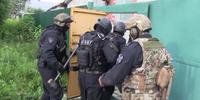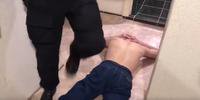Case of Shabliy in Kerch
Filter
- #
Artem Shabliy is officially charged with committing a crime under Part 2 of Article 282.2 of the Criminal Code of the Russian Federation.
- #
At 6 a.m., Valery Zarubin, an investigator for particularly important cases of the Kerch Investigative Directorate of the Investigative Committee of the Russian Federation for the Republic of Crimea and the city of Sevastopol, opens a criminal case against Artem Shabliy under Part 1.1. Article 282.2 of the Criminal Code of the Russian Federation. The reason for the initiation of the case is the report from the FSB of Russia in the Republic of Crimea and the city of Sevastopol.
Searches are being carried out at five addresses where local believers live. One of them is in the house of Artem Shabliy. During the 3-hour special events, the believer is not allowed to get dressed, as a result, he falls ill. Artyom's 4-year-old son injures his legs on shards of window pane that the security forces knocked out during the assault. Artem is detained and placed in an isolation ward.
Six believers, including the elderly, are being interrogated.
- #
By the decision of the judge of the Kerch City Court, Inessa Grigorievskaya, the search in Shabliy's home is recognized as legal.
In the evening, Artem Shabliy is released from the temporary detention facility under the obligation to appear as a suspect.
- #
Artem Shabliy, referring to Article 24 (part 2) of the Constitution of the Russian Federation, as well as Articles 19, 123, 127, 165 and 355 of the Code of Criminal Procedure of the Russian Federation, appeals to the Kerch City Court with an application for familiarization with the case materials, on the basis of which the court recognized the search in his house as legal.
Despite the fact that the state authorities are obliged to provide everyone with the opportunity to familiarize themselves with documents and materials that directly affect their rights and freedoms, the court refuses Shabliy.
- #
- #
Artem Shabliy makes a new attempt to get acquainted with the materials of the case in court, but again receives a refusal signed by the acting chairman of the city court Elena Kuzmina.
- #
Judge of the Supreme Court of Crimea Oleg Lebed withdraws from consideration the appeal of Artem Shabliy about the legality of the search in his home. The cause is unknown.
A day earlier, Judge Elena Spasenova made a similar decision regarding another believer, who is being held as a witness in the Shabliy case and also appealed against the search in her house.
- #
Shabliy's case is referred to the Kerch City Court for consideration by Judge Evgenia Romanenkova.
- #
About 20 people gather outside the courthouse to support Artem Shabliy, but they are not allowed into the courtroom. The police officers who arrived at the scene rewrite the data of the passports of those present and declare that it is forbidden to be near the courthouse, since this is a "public place" and a "specially protected security facility".
Court hearings begin. The defense draws attention to the fact that the prosecution uses the testimony of the provocateur I. Dukhanin, who in 2014 was convicted of inciting ethnic hatred.
The prosecutor announces the essence of the charge.
The defendant voices his attitude to the charge, which he considers illegal and containing "signs of discrimination and genocide." Shabliy claims a provocation on the part of the employees of the local department of the FSB and that some of the evidence in the case is fabricated and knowingly false. "It is me and my family in this criminal case who are actually victims of extremist actions directed against us. On the part of the investigator, my wife and I were repeatedly insulted and humiliated our human dignity on the basis of our religion, as well as education," says the believer.
He continues: "The text [of the document] is replete with many grammatical and semantic errors, excluding in some places the very possibility of understanding its meaning. For example, I am accused of "discussing followers ... of this religious organization." How to understand such an accusation, it seems impossible to me.
Shabliy wonders why his belief in God is seen as an extremist activity: "This is my personal religious activity, carried out by me since the age of four. My good deeds as a respectable, law-abiding Christian and citizen of my state... are presented in the present case as evil and criminal."
- #
It becomes known that the case has been transferred to Judge Irina Altanets.
- #
Before the start of the hearing, Artem Shabliy makes a statement, from which it follows that the defendant, "expressing his attitude to the charge, only once tried to quote the Bible, and at the same time was interrupted by the judge." He was not allowed to refer to the Holy Scriptures. Moreover, the court stated that it would regard "the justification of his [Shabliy's] innocence by references to the Bible as propaganda." The defendant regards this as a threat and pressure from the court.
Turning to the judge, he says: "I ask you not to prevent me from basing my arguments on the Bible for my defense in the present case. Otherwise, this trial will lose all meaning and will be like the court of the medieval Inquisition.
The judge allows Artem Shabliy to use the Bible, but without specifying a specific passage of Scripture.
The court examines the results of the linguistic examination, the protocols of the inspection of the scene of the incident, disks with ORM and material evidence. A video of the meeting with the provocateur Dukhanin was also viewed.
The defendant briefly explains that all the facts confirm only his personal religious activities, while the discussion of the Bible was initiated by Dukhanin himself, who "asked to come to his house with questions."
- #
Provocateur Dukhanin again does not appear at the hearing. The court proceeds to watch the video that he made during the conversation with the believers. After 30 minutes of watching conversations on everyday topics, the judge stops the recording and asks the prosecutor to prepare specific information for the next hearing to support the prosecution's arguments.
- #
To be published later.
- #
Speaking in the debate, the state prosecutor requests a sentence of 3 years in prison with restriction of liberty for 1 year for Artem Shabliy. On the basis of article 73 of the Criminal Code of the Russian Federation, she asks that this punishment be considered suspended with a probationary period of 4 years.
- #
Judge of the Kerch City Court of the Republic of Crimea Irina Altanets sentences Artem Shabliy to 2 years of suspended imprisonment with a probationary period of 3 years.


